What are your thoughts on anarchism (in general, not just anarcho-capitalism)? Can it work? Can it be reconciled with right-wing thought? Why do so many anarchists fundamentally disagree? Can we turn anarchists against the (((griffons)))?
Can we get more anarchist poners than just Leslie?
/mlpol/ - My Little Politics
Archived thread
Most strains of anarchism are left-wing. Right has ancapism, agorism, voluntaryism, and I think that's it.
I'm a fan of anarcho-egoism. It transcends the left-right divide and achieves pure selfishness.
I'm a fan of anarcho-egoism. It transcends the left-right divide and achieves pure selfishness.
1537804221.png (275.3 KB, 1016x296, Tommy Wiseau dyng is no option to su.png)

its bullshit. I did not hit her.
Anarchism is one of the most misunderstood ideological branches out there, on par perhaps with fascism. In popular view it is synonymous with chaos and senseless violence. Those whose history is limited to public school get the impression that all anarchists are bomb-throwers and sociopaths, which doesn't seem all that wrong considering modern day Antifa and whatnot. However, by dipping one's toes into anarchist philosophy one will find that classical anarchists had a wide variety of thought, which isn't all that surprising since they were guided largely by ideals and disentangled themselves from the complexities of statecraft. If one is lucky, he will discover right-libertarianism. Unfortunately, the message from this side has been muddled due to the (((Libertarian Party))) and its "socially liberal, economically conservative" retardation. In truth right-libertarianism or anarcho-capitalism is descended from the pure line of Austrian economics which originated as a critique of state excesses and eventually morphed into a complete philosophy. This field of thought is firmly within the Right as it is inherently opposed to social "justice" as well as socialism of both Marxist and "scientific" strands and so lends itself naturally to tradition. It is no accident that libertarianism is most prevalent among white Christian farmers, who are also staunchly conservative.
This is the essence of the "libertarian->alt-right pipeline." Just as libertarians arrive at their views from a rational analysis of economics and the nature of man, so they must also eventually realize that this truth can succeed only if the social order is conducive to these ideals. The philosopher who codified this was, of course, Hans-Hermann Hoppe (though it can be argued that his mentor Murray Rothbard could be considered "proto-alt-right" at least by Gottfried's standards). Therefore libertarianism merges seamlessly with traditionalism and even ethno-nationalism and one could embody each ideal without contradiction. Why then are there so many libertarians moving away towards a more purist traditionalist or even authoritarian view? I have been pondering this but I think that this interview explains it well: www.youtube.com/watch?v=F-KD_Do6w00. Truediltom, an absolutist, explains that Hoppe is a "pseudo-traditionalist" as he embraces traditionalism only out of pragmatism and for materialistic ends in order for a functional anarchist society. Hoppe is through-and-through a rationalist. In contrast, the true traditionalist celebrates tradition for its own sake as it is a permanent metaphysical truth, exists outside material considerations, and is an anchor for society regardless of how prosperous it is. Traditionalism is rooted in some mysticism as people are centered not around purely practical considerations but around ideals and truths they consider greater than themselves.
While there is much I agree with this, I dissent on the assertion by absolutists that the monarch can be an unshaken center of society, that he is beyond conceptions of power, and that he is a guardian of traditionalism. This got me thinking: does an anarchist line of traditionalism exist? A quick search later and I found this fascinating article: https://attackthesystem.com/2016/11/20/anarcho-fascism-an-overview-of-right-wing-anarchist-thought/. While the website is somewhat retarded (they believe anarchism can be united between left and right, which is plainly impossible), it is a very good article and presents a detailed overview of anarchism on the right. There are many more conceptions of anarchy on the right than I thought possible. Besides the well-known Rothbardian variant, there were non-capitalist anarchies advocated by Ernst Junger, the Distributists, and more recent radical thinkers. Interestingly, Evola was somewhat of an anarchist, though he did not consider himself as such and could not be rigorously defined so.
What the article gets wrong is defining Max Stirner as being on the right-end of anarchism. While he did ridicule social justice and utopians, he likewise disdained traditionalists and those who espoused liberty for its own sake or that of "humanity." Stirner believed in nothing but working for oneself, and so is essentially a left-wing version of Machiavelli. He is certainly left-wing due to his opposition to all hierarchy. He is an anarchist, but a more pure one than those who believe in "democratic workers' councils" and such nonsense.
Anarchists cannot be united because they believe in completely different things; it's like saying Hitler and Lenin could find common ground. Left-wing anarchists believe in the destruction of hierarchy and/or social justice. The Right believes in hierarchy, whether voluntary (capitalism) or natural (traditionalism). The left wants to destroy the state in order to reorder society along utopian or empiricist lines. The right wants to destroy the state because it is a threat to tradition and the natural order of society. Anarcho-capitalism and traditionalist anarchists, despite their differences, can find common ground and mutual benefit (man is neither entirely spirit nor entirely physical and society should reflect that), but anything left-of-center is incompatible. It is no accident that the dozen-or-so strains of leftist anarchism attack the foundation of society in various ways, while right-wing anarchism uplifts the same aspects under attack.
This is the essence of the "libertarian->alt-right pipeline." Just as libertarians arrive at their views from a rational analysis of economics and the nature of man, so they must also eventually realize that this truth can succeed only if the social order is conducive to these ideals. The philosopher who codified this was, of course, Hans-Hermann Hoppe (though it can be argued that his mentor Murray Rothbard could be considered "proto-alt-right" at least by Gottfried's standards). Therefore libertarianism merges seamlessly with traditionalism and even ethno-nationalism and one could embody each ideal without contradiction. Why then are there so many libertarians moving away towards a more purist traditionalist or even authoritarian view? I have been pondering this but I think that this interview explains it well: www.youtube.com/watch?v=F-KD_Do6w00. Truediltom, an absolutist, explains that Hoppe is a "pseudo-traditionalist" as he embraces traditionalism only out of pragmatism and for materialistic ends in order for a functional anarchist society. Hoppe is through-and-through a rationalist. In contrast, the true traditionalist celebrates tradition for its own sake as it is a permanent metaphysical truth, exists outside material considerations, and is an anchor for society regardless of how prosperous it is. Traditionalism is rooted in some mysticism as people are centered not around purely practical considerations but around ideals and truths they consider greater than themselves.
While there is much I agree with this, I dissent on the assertion by absolutists that the monarch can be an unshaken center of society, that he is beyond conceptions of power, and that he is a guardian of traditionalism. This got me thinking: does an anarchist line of traditionalism exist? A quick search later and I found this fascinating article: https://attackthesystem.com/2016/11/20/anarcho-fascism-an-overview-of-right-wing-anarchist-thought/. While the website is somewhat retarded (they believe anarchism can be united between left and right, which is plainly impossible), it is a very good article and presents a detailed overview of anarchism on the right. There are many more conceptions of anarchy on the right than I thought possible. Besides the well-known Rothbardian variant, there were non-capitalist anarchies advocated by Ernst Junger, the Distributists, and more recent radical thinkers. Interestingly, Evola was somewhat of an anarchist, though he did not consider himself as such and could not be rigorously defined so.
What the article gets wrong is defining Max Stirner as being on the right-end of anarchism. While he did ridicule social justice and utopians, he likewise disdained traditionalists and those who espoused liberty for its own sake or that of "humanity." Stirner believed in nothing but working for oneself, and so is essentially a left-wing version of Machiavelli. He is certainly left-wing due to his opposition to all hierarchy. He is an anarchist, but a more pure one than those who believe in "democratic workers' councils" and such nonsense.
Anarchists cannot be united because they believe in completely different things; it's like saying Hitler and Lenin could find common ground. Left-wing anarchists believe in the destruction of hierarchy and/or social justice. The Right believes in hierarchy, whether voluntary (capitalism) or natural (traditionalism). The left wants to destroy the state in order to reorder society along utopian or empiricist lines. The right wants to destroy the state because it is a threat to tradition and the natural order of society. Anarcho-capitalism and traditionalist anarchists, despite their differences, can find common ground and mutual benefit (man is neither entirely spirit nor entirely physical and society should reflect that), but anything left-of-center is incompatible. It is no accident that the dozen-or-so strains of leftist anarchism attack the foundation of society in various ways, while right-wing anarchism uplifts the same aspects under attack.
Also, I couldn't resist making a political compass, though there is much to be desired. I enjoyed the concept from this excerpt:
>The relationship between the Right and the state in many ways mirrors that of the Left in the sense that both Right and Left have something of a triangular interaction with systems of institutional and legal authority. Both Left and Right can be divided into reformist, libertarian, or totalitarian camps. In the case of the Left, a leftist may be a reform liberal or social democrat, they may be an anarchist or a left-libertarian, or they may be a totalitarian in the tradition of Lenin, Stalin, Mao, and others. Similarly, a rightist may advocate for reforms of a conservative or rightward leaning nature, they may be an anarchist of the right or a radical anti-statist, or a person of the Right may be a proponent of some kind of right-wing authoritarianism, or a totalitarian in the fascist tradition.
>The relationship between the Right and the state in many ways mirrors that of the Left in the sense that both Right and Left have something of a triangular interaction with systems of institutional and legal authority. Both Left and Right can be divided into reformist, libertarian, or totalitarian camps. In the case of the Left, a leftist may be a reform liberal or social democrat, they may be an anarchist or a left-libertarian, or they may be a totalitarian in the tradition of Lenin, Stalin, Mao, and others. Similarly, a rightist may advocate for reforms of a conservative or rightward leaning nature, they may be an anarchist of the right or a radical anti-statist, or a person of the Right may be a proponent of some kind of right-wing authoritarianism, or a totalitarian in the fascist tradition.
Anarchy is a meme. It can never work, hierarchies are part of human nature.
An anarcho-capitalist libertarian social order such as described by Professor Hoppe is my ideal, although I doubt it will come to fruition in my own lifetime.
>Can we get more anarchist poners than just Leslie?
That actually is a pretty cool idea, we could have an agorist pony that works in the black market, a cyborg transhumanist (or in this case transequinist) pony, and a primitivist pony who lives in garbage and hates technology.
>>174753
AnCap would still have hierarchies. Some don't even consider it actual anarchism because of that, mainly leftist anarchists, but they're hypocrites, hierarchies are necessary for all social systems, we just acknowledge that.
>>174624
This is a good post
>Can we get more anarchist poners than just Leslie?
That actually is a pretty cool idea, we could have an agorist pony that works in the black market, a cyborg transhumanist (or in this case transequinist) pony, and a primitivist pony who lives in garbage and hates technology.
>>174753
AnCap would still have hierarchies. Some don't even consider it actual anarchism because of that, mainly leftist anarchists, but they're hypocrites, hierarchies are necessary for all social systems, we just acknowledge that.
>>174624
This is a good post
Anarchism can work, but if you expect people to not build their own little societies you are wrong.
You'll have people find their groups that have similar beliefs, needs that they can fulfill for each other, and et cetera. In the end, I feel like it would evolve to some sort of feudalism, without a central leader dictating over all the fiefs.
But hey, that's just my two cents and I don't know enough political theory to be a good source.
You'll have people find their groups that have similar beliefs, needs that they can fulfill for each other, and et cetera. In the end, I feel like it would evolve to some sort of feudalism, without a central leader dictating over all the fiefs.
But hey, that's just my two cents and I don't know enough political theory to be a good source.
>>174773
>An anarcho-capitalist libertarian social order such as described by Professor Hoppe is my ideal
Hoppe is COINTELPRO; he's there to make people think libertarians are all Pinochet-worshipping crazies who want to kill everyone who disagrees with them.
>An anarcho-capitalist libertarian social order such as described by Professor Hoppe is my ideal
Hoppe is COINTELPRO; he's there to make people think libertarians are all Pinochet-worshipping crazies who want to kill everyone who disagrees with them.
>>174606
I dont think it can work just due to the nature of Mankind and any animal worth a shit. We are social creatures and will make groups. Every time someone is knocked out of power someone is going to fill that void at some point. You would be a fool not to make or join a group. It seems like some hippy Kumbaya moment would have to take place for it to actually happen. Which is just not realistic, considering someone just got removed. Then to keep it that way is also a fairy tale.
You can see this shit with kids making gangs, you would have to remove nature for this to happen.
I dont think it can work just due to the nature of Mankind and any animal worth a shit. We are social creatures and will make groups. Every time someone is knocked out of power someone is going to fill that void at some point. You would be a fool not to make or join a group. It seems like some hippy Kumbaya moment would have to take place for it to actually happen. Which is just not realistic, considering someone just got removed. Then to keep it that way is also a fairy tale.
You can see this shit with kids making gangs, you would have to remove nature for this to happen.
>>174854
anarchism is when there is no ruling party, no entity to help lead or help govern a group.
antifa is not anarchist because they have their socialist leader help them with planning and development of the organization.
Buisnesses are not anarchist as we have the CEOs and bankers owning the money, and having their workers follow their direction, though either payment or through other means.
the only thing I can think of that is even close to true anarchism is 4Chan there people have the freedom to post whatever they want and organize whatever they want, however, there is still government control such as the FBI monitoring and taking down posts, and 4Chan janitors to name a few examples.
Even if 4chan became a true anarchy, there would be no organization. noo organization would essentially mean that 4chan would not be sustainable for very long. board would need to be merged as that would imply there is orginisation. Organization would imply that there is a form of government, thereby making the system not anarchist, but something entirely different.
The group mentality would not apply either, as acting as one would require that all members collaborate, and such collaboraton is orginisation. orginisation is, as I said before, not anarchy.
Anarhcy cant work as government is always needed to maintain some sort of order. and without order, we humans are doomed to fail.
anarchism is when there is no ruling party, no entity to help lead or help govern a group.
antifa is not anarchist because they have their socialist leader help them with planning and development of the organization.
Buisnesses are not anarchist as we have the CEOs and bankers owning the money, and having their workers follow their direction, though either payment or through other means.
the only thing I can think of that is even close to true anarchism is 4Chan there people have the freedom to post whatever they want and organize whatever they want, however, there is still government control such as the FBI monitoring and taking down posts, and 4Chan janitors to name a few examples.
Even if 4chan became a true anarchy, there would be no organization. noo organization would essentially mean that 4chan would not be sustainable for very long. board would need to be merged as that would imply there is orginisation. Organization would imply that there is a form of government, thereby making the system not anarchist, but something entirely different.
The group mentality would not apply either, as acting as one would require that all members collaborate, and such collaboraton is orginisation. orginisation is, as I said before, not anarchy.
Anarhcy cant work as government is always needed to maintain some sort of order. and without order, we humans are doomed to fail.
>>175187
That is the "classical anarchist" definition, which opposes all hierarchy. Anarchism simply means there is no coercive hierarchy; that is, a group saying "serve us or we will punish you." Anarchism, especially right-wing variants, is perfectly compatible with natural hierarchy (such as that within family) as well as voluntary hierarchy (religion or business, which you choose to join or leave).
No hierarchy at all is plainly stupid and would collapse as you said. Anarchism is distinct from other ideologies as while they seek an optimal form of governmental coercion, anarchism desires an alternative to it entirely.
That is the "classical anarchist" definition, which opposes all hierarchy. Anarchism simply means there is no coercive hierarchy; that is, a group saying "serve us or we will punish you." Anarchism, especially right-wing variants, is perfectly compatible with natural hierarchy (such as that within family) as well as voluntary hierarchy (religion or business, which you choose to join or leave).
No hierarchy at all is plainly stupid and would collapse as you said. Anarchism is distinct from other ideologies as while they seek an optimal form of governmental coercion, anarchism desires an alternative to it entirely.
>>174606
Same as my thoughts on communism, it runs counter to our nature as human beings that naturally form social hierarchies. I'm not particularly worried about any form of anarchy becoming popular enough to overthrow and reorder society for that reason, most people with common sense recognise it as a shitty philosophy.
Same as my thoughts on communism, it runs counter to our nature as human beings that naturally form social hierarchies. I'm not particularly worried about any form of anarchy becoming popular enough to overthrow and reorder society for that reason, most people with common sense recognise it as a shitty philosophy.
I always saw anarchism as the starting social point.
Imagine being thrown in a field with food, resources, and basic accomodations.
No rules, so you can do what you want. Eat or fuck the food, build or destroy your resources, rest or throw away your accomodations.
You are free to do whatever you want, you represent yourself in that patch of land.
Now, if you survived long enough, maybe you know how to manage the food, create stuff with the resources, and make better accomodations.
After a while, some people will see you live better, so they will come closer. This is the starting point for anything, being social ladder or politics.
Since you are the leader because you live better, you can focus in an equal share so everyone lives nicely, you can teach those people how to fight so you conquer more land, or give orders to live accomodated as they do all the work you did.
Anarchism is just freedom. Whatever laws or morals your "state" has is up to you.
Imagine being thrown in a field with food, resources, and basic accomodations.
No rules, so you can do what you want. Eat or fuck the food, build or destroy your resources, rest or throw away your accomodations.
You are free to do whatever you want, you represent yourself in that patch of land.
Now, if you survived long enough, maybe you know how to manage the food, create stuff with the resources, and make better accomodations.
After a while, some people will see you live better, so they will come closer. This is the starting point for anything, being social ladder or politics.
Since you are the leader because you live better, you can focus in an equal share so everyone lives nicely, you can teach those people how to fight so you conquer more land, or give orders to live accomodated as they do all the work you did.
Anarchism is just freedom. Whatever laws or morals your "state" has is up to you.
For the longest time I've been conflicted over two contradictory ideas.
the first is
"Everything shall go toward the benefit of the state"
meaning every industry, every organization, every citizen must do their part to benefit the state in some way.
I believe this while also believing in "If something benefits you in any way, then any action is acceptable regardless of what the State says."
Basically self interest in the only thing that matters, everyone else be dammed, the state included...
However I've come up with a way to resolve these two conflicting principles.
what if...
>pic related
I AM THE STATE.
the first is
"Everything shall go toward the benefit of the state"
meaning every industry, every organization, every citizen must do their part to benefit the state in some way.
I believe this while also believing in "If something benefits you in any way, then any action is acceptable regardless of what the State says."
Basically self interest in the only thing that matters, everyone else be dammed, the state included...
However I've come up with a way to resolve these two conflicting principles.
what if...
>pic related
I AM THE STATE.
1538913264.jpg (105.8 KB, 1263x632, fallout_equestria___steelhooves_by_theastralwanderer.jpg)

When watching this video the last thing I was expecting was a redpill on government.
Just substitute "the state" for "raiders" from this point on.
[YouTube] The Evil Ending to Nuka World & Why It's Evil - Fallout 4 Lore![]()
Just substitute "the state" for "raiders" from this point on.
[YouTube] The Evil Ending to Nuka World & Why It's Evil - Fallout 4 Lore
>>177850
>Redpill on government
that's not a redpill that's cognitive dissonance
>Oxhorn
oh that's why.
yes I agree that "raiders/state" are parasites.
however i disagree that anything can be done about it.
its called Might Makes Right for a reason.
>inb4 the minutemen will protect you
the minutemen will inevitably become a state.
>Redpill on government
that's not a redpill that's cognitive dissonance
>Oxhorn
oh that's why.
yes I agree that "raiders/state" are parasites.
however i disagree that anything can be done about it.
its called Might Makes Right for a reason.
>inb4 the minutemen will protect you
the minutemen will inevitably become a state.
21 replies | 19 files | 17 UUIDs | Archived
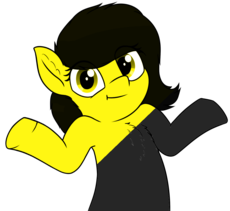
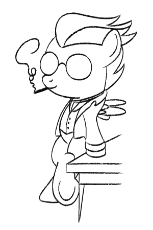
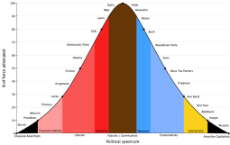
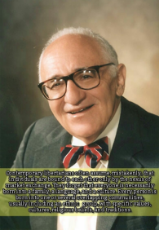
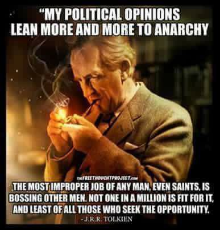
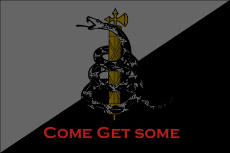
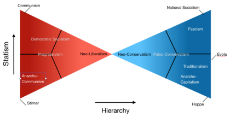
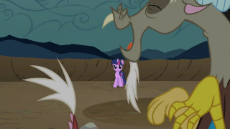
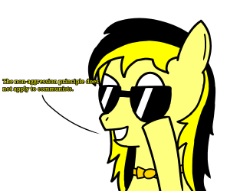

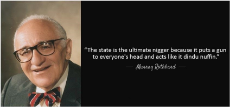
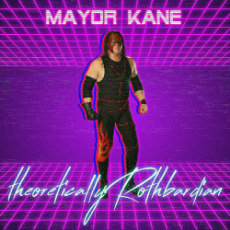
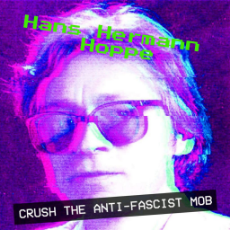



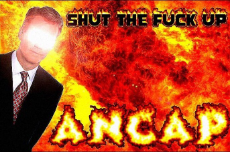
 Ex: Type :littlepip: to add Littlepip
Ex: Type :littlepip: to add Littlepip  Ex: Type :eqg-rarity: to add EqG Rarity
Ex: Type :eqg-rarity: to add EqG Rarity 